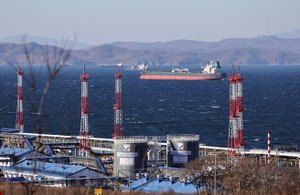Exclusive-Russian fuel exports fall in 2024 as drone attacks, bans add to sanctions pressure
Published by Global Banking & Finance Review®
Posted on January 17, 2025
3 min readLast updated: January 27, 2026

Published by Global Banking & Finance Review®
Posted on January 17, 2025
3 min readLast updated: January 27, 2026

Russian fuel exports dropped 10% in 2024 due to drone attacks, sanctions, and export bans, affecting global oil markets.
MOSCOW (Reuters) -Russian seaborne oil product exports fell by almost 10% in 2024 after Ukrainian drone attacks damaged major refineries and as higher funding costs and a government gasoline export ban added to pressure from Western sanctions, industry sources said.
Russia, one of the world's largest oil and fuel exporters alongside Saudi Arabia and the U.S., has been trying to access new markets in Asia and South America since the West imposed sanctions over Moscow's military move on Ukraine in 2022.
Lower fuel exports mean Russia's oil firms have to boost exports of crude to maintain revenues, but such options are limited to just India, China and Turkey, which still buy Russian crude despite sanctions and have their own big refineries.
Total Russian exports of all fuels including fuel oil, diesel, naphtha and jet kerosene stood at 113.7 million metric tons last year, down 9.1% from 2023, two market sources told Reuters, citing export data.
The 2024 export figure would amount to approximately 2.3 million barrels per day if the 7.33 crude oil conversion ratio of ton to barrel is used. The exact breakdown of products - all of which use a different conversion ratio - was not known.
Russia's overall oil processing fell to around 267 million metric tons (5.4 million bpd) in 2024, its lowest level since 2012, due to unplanned outages and weaker refining margins, Reuters calculations based on data from market sources showed.
DRONE ATTACKS
Ukraine attacked several Russian refineries and fuel facilities, including Lukoil's Volgograd refinery, Gazprom Neft's Omsk oil refinery in western Siberia, the Slavyansk and Novoshakhtinsk refineries and Rosneft's Black Sea oil refinery in Tuapse.
The refineries also came under pressure due to falling fuel prices, rising interest rates and Russia's ban on gasoline exports, market sources said.
Total oil product exports via the Baltic ports of Primorsk, Vysotsk, St. Petersburg and Ust-Luga fell by 9% in 2024 from the previous year to 61.96 million tons, data showed.
Fuel exports via Russia's Black Sea and Azov Sea ports fell to 42.75 million tons, down 10% from 2023.
Exports via the Russian Black Sea port of Tuapse fell by a third to 9.1 million tons due to outages after drone attacks, suspended processing and decreased refining at Rosneft's refinery, market sources told Reuters.
Meanwhile, exports through the Black Sea port of Novorossiisk rose 4% to 19 million tons, data showed.
Oil product export supplies from Russia's Arctic ports of Murmansk and Arkhangelsk fell to 1.01 million tons, down 14%, while fuel export loadings at Far East ports fell 3% from 2023 to 7.97 million tons.
Russia's seaborne oil product exports rose 10.8% month on month in December to 10.37 million tons, including 4.17 million tons loaded via Russia's Black Sea and Azov Sea ports, 5.49 million tons through Baltic Sea ports and 637,100 tons via Russia`s Far East ports, data from sources and Reuters calculations showed.
(Reporting by Reuters; Editing by Alexander Smith)
The article discusses the decline in Russian fuel exports in 2024 due to drone attacks, sanctions, and export bans.
Drone attacks damaged major refineries, contributing to a 10% drop in Russian fuel exports in 2024.
Reduced exports impact global oil markets and force Russia to seek new markets in Asia and South America.
Explore more articles in the Finance category
